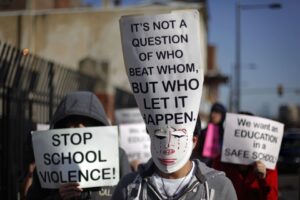Education has a very large impact when it comes to peace building. Education and civilization has so far fostered the concept of peace world wide. Many a times, conflicts are caused by national crises which tend to affect a large number of people. These include:
1)Poverty
2)Hunger
3)Diminishing natural resources
4)Water scarcity
5)Unemployment
6) Racism
7)Xenophobia, among others,
These crises pose challenges for peace and create fertile grounds for conflict.
Education contributes in the peace building process in the following ways:
i) Education leads to employment which helps most people to be able to get jobs and be able to fed for themselves, hence eradicating poverty.
ii) The fact that students from different ethnic groups and races, live and learn under the same conditions, they get to interact. This brings forth understanding of different cultures. Thus people get to respect each other, not only in schools but outside too, and eradicate racism.
iii) The introduction of peace education in schools. Learning peace education is the process of acquiring the values, the knowledge and developing the attitudes, skills, and behaviors to live in harmony with oneself, with others, and with the natural environment.
iv) In schools students are guided under laws and regulations, which help in ensuring that each student does what is expected of them and also helps build a sense of responsibility. If a student does anything wrong they face the consequences of their actions. Therefore shaping responsible adults who are fully capable of following the rules of the country.
v) Education offers the learners the ability to make rational decisions. In most institutions they have actually started teaching Critical thinking as a common unit for all learners. This helps in ensuring that people get to think and offer responsible approach and solutions when they are faced with crises. This promotes peace as people will tend to resort to better channels of solving disputes instead of opting for violence.
The educational action for promoting the concept of peace, concerns the content of education and training. Educational resources and material, school and university life, initial and ongoing training for teachers, research, and ongoing training for young people and adults.
A culture of peace must take root in the classroom from an early age. It must continue to be reflected in the curricula at secondary and tertiary levels. However, the skills for peace and non-violence can only be learned and perfected through practice. Active listening, dialogue, mediation, and cooperative learning are delicate skills to develop. This is education in the widest sense.
It is a dynamic, long term process: a life-time experience. It means providing both children and adults with an understanding of and respect for universal values and rights. It requires participation at all levels – family, school, places of work, news rooms, play grounds, and the community as well as the nation.
About the author
Carolyne Wanjiku is our marketing intern. She holds a Bachelor of Education, and has a background in teaching Maths and Science to primary school Students.

